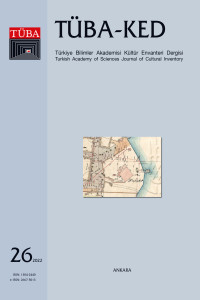Abstract
Coal production, which has a large share of the world's energy resources, has also created an important industry branch in Turkey. The businesses established in this area during the Ottoman Period continued their existence in the Republican Period as well. With the industrialization movements in Europe that started in England in the 19th century, the Ruhr Region, located in the German state of North Rhine-Westphalia, has become the center of coal production. The facilities involved in coal production not only have tangible cultural heritage elements belonging to original production processes and building materials but also contain intangible elements of the cultural and social life of the society they belong to. With the destruction of coal production in the industrialized countries and the emergence of alternative clean energy sources, it was decided to close these enterprises over time. With this transition, coal mine processing plants located in the Ruhr Region and incorporating intangible and tangible periodical elements have been evaluated within the scope of adaptive reuse as a cultural heritage. In Turkey, on the other hand, coal maintains its importance among energy sources. Since the economic benefit obtained from coal production is at the forefront, the change and destruction of the building groups in the production area are seen as normal. For this reason, it is important to record and document the coal mine processing plants, which are in danger of extinction. In this context, attention has been drawn to the potential of certain construction sites in Zonguldak belonging to the establishments and operating directorates of the Turkish Hard Coal Authority, which can be evaluated within the scope of adaptive reuse examples in the Ruhr Region. The aim of the study is to increase awareness about these building groups in order to protect the coal-based industrial heritage and to develop criteria that will allow appropriate use transformation scenarios in line with the needs of the region.
Keywords
Industrial Heritage Ruhr Area Adaptive Reuse Coal Mine Processing Plants Üzülmez Hard Coal Enterprise
References
- Zaman, Ekrem M. (2012). Zonguldak Kömür Havzası: İnsan, Mekan, Zaman. Zonguldak: TMMOB Maden Mühendisleri Odası
Abstract
Dünya enerji kaynakları arasında büyük bir paya sahip olan kömür üretimi, Türkiye’de önemli bir sanayi dalı oluşturmuştur. Bu alanda Osmanlı Dönemi’nde kurulan işletmeler Cumhuriyet Dönemi’nde de varlıklarını sürdürmüşlerdir. 19. yüzyılda İngiltere'de başlayan Avrupa'daki sanayileşme hareketleri ile Almanya'nın Kuzey Ren Vestfalya eyaletinde yer alan Ruhr Bölgesi, kömür üretiminin merkezi haline gelmiştir. Kömür üretiminde yer alan tesisler, özgün üretim süreçlerine ve yapı malzemelerine ait somut kültürel miras niteliğindeki ögelere sahip olmasının yanı sıra ait oldukları toplumun kültürel ve sosyal yaşamlarına dair soyut ögeleri de barındırmaktadırlar. Endüstrileşmiş ülkelerde kömür üretiminin çevreye verdiği tahribat ve alternatif temiz enerji kaynaklarının ortaya çıkması ile zamanla bu işletmelerin kapatılması kararlaştırılmıştır. Bu geçiş ile birlikte Ruhr Bölgesi’nde yer alan, soyut ve somut dönemsel ögeleri bünyesinde barındıran kömür madeni işleme tesisleri, kültürel bir miras olarak kullanım dönüşümü kapsamında değerlendirilmişlerdir.
Türkiye’de ise kömür enerji kaynakları arasındaki önemini korumaktadır. Kömür üretiminden elde edilen ekonomik fayda ön planda olduğu için üretim sahası içerisinde yer alan yapı gruplarının değişimi ve yıkımı olağan görülmektedir. Bu nedenle yok olma tehlikesiyle karşı karşıya olan kömür madeni işleme tesislerinin kayıt altına alınarak belgelenmesi önem arz etmektedir. Bu kapsamda Zonguldak’ta yer alan, Türkiye Taşkömürü Kurumu’na bağlı müessese ve işletme müdürlüklerine ait belirli yapı sahalarının, Ruhr Bölgesi’nde yer alan kullanım dönüşümü örnekleri kapsamında değerlendirilebilecek olası potansiyellerine dikkat çekilmiştir. Çalışmanın amacı kömüre dayalı endüstri mirasının korunabilmesi için bu yapı grupları hakkındaki farkındalığı arttırmak ve söz konusu bölgenin ihtiyaçları doğrultusunda uygun kullanım dönüşümü senaryolarına olanak sağlayacak kriterler geliştirmektir.
Keywords
Endüstriyel Miras Ruhr Bölgesi Kullanım Dönüşümü Kömür Madeni İşleme Tesisleri Üzülmez Taşkömürü İşletme Müessesesi
References
- Zaman, Ekrem M. (2012). Zonguldak Kömür Havzası: İnsan, Mekan, Zaman. Zonguldak: TMMOB Maden Mühendisleri Odası
Details
| Primary Language | Turkish |
|---|---|
| Subjects | Cultural Studies |
| Journal Section | Research Articles |
| Authors | |
| Publication Date | December 15, 2022 |
| Submission Date | November 28, 2021 |
| Published in Issue | Year 2022 Issue: 26 |



